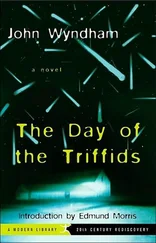John Wyndham
THE CHYRSALIDS
When I was quite small I would sometimes dream of a city — which was strange because it began before I even knew what a city was. But this city, clustered on the curve of a big blue bay, would come into my mind. I could see the streets, and the buildings that lined them, the waterfront, even boats in the harbour; yet, waking, I had never seen the sea, or a boat….
And the buildings were quite unlike any I knew. The traffic in the streets was strange, carts running with no horses to pull them; and sometimes there were things in the sky, shiny fish-shaped things that certainly were not birds.
Most often I would see this wonderful place by daylight, but occasionally it was by night when the lights lay like strings of glow-worms along the shore, and a few of them seemed to be sparks drifting on the water, or in the air.
It was a beautiful, fascinating place, and once, when I was still young enough to know no better, I asked my eldest sister, Mary, where this lovely city could be.
She shook her head, and told me that there was no such place — not now. But, perhaps, she suggested, I could somehow be dreaming about times long ago. Dreams were funny things, and there was no accounting for them; so it might be that what I was seeing was a bit of the world as it had been once upon a time — the wonderful world that the Old People had lived in; as it had been before God sent Tribulation.
But after that she went on to warn me very seriously not to mention it to anyone else; other people, as far as she knew, did not have such pictures in their heads, either sleeping or waking, so it would be unwise to mention them.
That was good advice, and luckily I had the sense to take it. People in our district had a very sharp eye for the odd, or the unusual, so that even my left-handedness caused slight disapproval. So, at that time, and for some years afterwards, I did not mention it to anyone — indeed, I almost forgot about it, for as I grew older the dream came less frequently, and then very rarely.
But the advice stuck. Without it I might have mentioned the curious understanding I had with my cousin Rosalind, and that would certainly have led us both into very grave trouble — if anyone had happened to believe me. Neither I nor she, I think, paid much attention to it at that time: we simply had the habit of caution. I certainly did not feel unusual. I was a normal little boy, growing up in a normal way, taking the ways of the world about me for granted. And I kept on like that until the day I met Sophie. Even then, the difference was not immediate. It is hind-sight that enables me to fix that as the day when my first small doubts started to germinate.
That day I had gone off by myself, as I often did. I was, I suppose, nearly ten years old. My next sister, Sarah, was five years older, and the gap meant that I played a great deal alone. I had made my way down the cart-track to the south, along the borders of several fields until I came to the high bank, and then along the top of the bank for quite a way.
The bank was no puzzle to me then: it was far too big for me to think of as a thing that men could have built, nor had it ever occurred to me to connect it with the wondrous doings of the Old People whom I sometimes heard about. It was simply the bank, coming round in a wide curve, and then running straight as an arrow towards the distant hills; just a part of the world, and no more to be wondered at than the river, the sky, or the hills themselves.
I had often gone along the top of it, but seldom explored on the farther side. For some reason I regarded the country there as foreign — not so much hostile, as outside my territory. But there was a place I had discovered where the rain, in running down the far side of the bank, had worn a sandy gully. If one sat in the start of that and gave a good push off, one could go swishing down at a fine speed, and finally fly a few feet through the air to land in a pile of soft sand at the bottom.
I must have been there half a dozen times before, and there had never been anyone about, but on this occasion, when I was picking myself up after my third descent and preparing for a fourth, a voice said: ‘Hullo!’
I looked round. At first I could not tell where it came from; then a shaking of the top twigs in a bunch of bushes caught my eye. The branches parted, and a face looked out at me. It was a small face, sunburned, and clustered about by dark curls. The expression was somewhat serious, but the eyes sparkled. We regarded one another for a moment, then:
‘Hallo,’ I responded.
She hesitated, then pushed the bushes farther apart. I saw a girl a little shorter than I was, and perhaps a little younger. She wore reddish-brown dungarees with a yellow shirt. The cross stitched to the front of the dungarees was of a darker brown material. Her hair was tied on either side of her head with yellow ribbons. She stood still for a few seconds as though uncertain about leaving the security of the bushes, then curiosity got the better of her caution, and she stepped out.
I stared at her because she was completely a stranger. From time to time there were gatherings or parties which brought together all the children for miles around, so that it was astonishing to encounter one that I had never seen before.
‘What’s your name?’ I asked her.
‘Sophie,’ she told me. ‘What’s yours?’
‘David,’ I said. ‘Where’s your home?’
‘Over there,’ she said, waving her hand vaguely towards the foreign country beyond the bank.
Her eyes left mine and went to the sandy runnel down which I had been sliding.
‘Is that fun?’ she inquired, with a wistful look.
I hesitated a moment before inviting her, then:
‘Yes,’ I told her. ‘Come and try.’
She hung back, turning her attention to me again. She studied me with a serious expression for a second or two, then made up her mind quite suddenly. She scrambled to the top of the bank ahead of me.
She sped down the runnel with curls and ribbons flying. When I landed she had lost her serious look, and her eyes were dancing with excitement.
‘Again,’ she said, and panted back up the bank.
It was on her third descent that the misadventure occurred. She sat down and shoved off as before. I watched her swish down and come to a stop in a flurry of sand. Somehow she had contrived to land a couple of feet to the left of the usual place. I made ready to follow, and waited for her to get clear. She did not.
‘Go on,’ I told her impatiently.
She tried to move, and then called up,
‘I can’t. It hurts.’
I risked pushing off, anyway, and landed close beside her.
‘What’s the matter?’ I asked.
Her face was screwed up. Tears stood in her eyes.
‘My foot’s stuck,’ she said.
Her left foot was buried. I scrabbled the soft sand clear with my hands. Her shoe was jammed in a narrow space between two up-pointed stones. I tried to move it, but it would not budge.
‘Can’t you sort of twist it out?’ I suggested.
She tried, lips valiantly compressed.
‘It won’t come.’
‘I’ll help pull,’ I offered.
‘No, no! It hurts,’ she protested.
I did not know what to do next. Very clearly her predicament was painful. I considered the problem.
‘We’d better cut the laces so you can pull your foot out of the shoe. I can’t reach the knot,’ I decided.
‘No!’ she said, alarmed. ‘No, I mustn’t.’
She was so emphatic that I was baffled. If she were to pull the foot out of the shoe, we might knock the shoe itself free with a stone, but if she would not, I didn’t see what was to be done. She lay back on the sand, the knee of the trapped leg sticking up in the air.
Читать дальше












